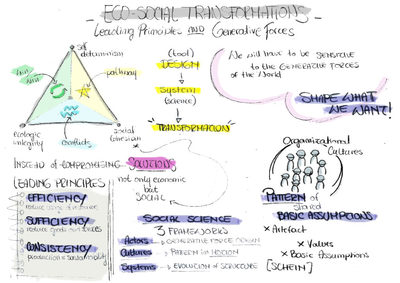Eco-Social transformations: Leading principles and generative forces
Metzner-Szigeth, Andreas (2018) Eco-Social transformations: Leading principles and generative forces. In: Proceedings of RSD7, Relating Systems Thinking and Design 7, 23-26 Oct 2018, Turin, Italy.
Preview |
Text
Metzner-Szigeth_Slides_2018.pdf Download (1MB) | Preview |
![MetznerSzigeth_Leading_2018.jpg [thumbnail of MetznerSzigeth_Leading_2018.jpg]](https://openresearch.ocadu.ca/2682/2.hassmallThumbnailVersion/MetznerSzigeth_Leading_2018.jpg)  Preview |
Image
MetznerSzigeth_Leading_2018.jpg Download (137kB) | Preview |
Abstract
According to the UN there is need to attain 17 heterogeneous goals with 169 different targets in order to reach sustainable development. Is this programme strong enough to become successful? The decisive point for assessing its quality is whether it offers only a catalogue of demands or an integrated concept. Satisfying human needs whilst respecting the limits of the biosphere with future-capable forms and rates of production and consumption are of central importance. But an alternative approach to civilizational progress has to outline as well that kind of eco-social transformations by which these requirements could be realized. Major transitions of this type should be multi-dimensional. They have to provide the capacity of simultaneously altering several dimensions of human life: social and ecological as well as economic and political.
Re-directing human progress cannot be done by means of superior ethics and good will alone. Instead, effective forms of management and governance are required. Realizing sustainable development in practice takes place under conditions of targeting-conflicts about priorities, utilization competences about resources as well as divergent interests and contrasting visions of how “our common future” should look like. Facing “great challenges” of humankind therefore means tailoring well-designed interventions in the ongoing dynamics of existing patterns: in communicative culture as well as in material culture, in the organizational sphere as well as in the technological sphere.
Two promising research perspectives working on the development of solutions for the above framed problems concern leading principles and generative forces. With leading principles for eco-social transformations the emphasis is on efficiency, sufficiency and consistency. They respond to different groundings and favour distinct instruments. They are supported by different arguments and seem to be excluding each other, as suggested by the semantics of “hard” and “soft” sustainability. We can understand them as strategies that are competing for attention on the public agenda: for being accepted and having the chance to become converted into practice. Besides focussing on the advantages of a balanced approach further research and development (above all in “sustainability science” itself) should concentrate on delivering fresh understandings and novel concepts like the cradle-to-cradle approach.
The guiding question for this research perspective reads:
How to combine these strategies with effective principles of design such as to enable far reaching transformations in material culture and social life?
The other research perspective deals with generative forces that link valuable personal resources like awareness, imagination and motivation to institutional transactions and social change. The social sciences provide three well-known categories: actors, cultures and systems. What kind of conditions and drivers for eco-social transformations can be identified within these contexts? How do they correlate with generative forces?
After giving an overview we will focus on the field of organizational cultures and their relationship to generative forces. Here, they are stimulating creativity, innovation and entrepreneurship, finding novel solutions to old problems and other understandings of conflicts, that may lead to new beginnings and vital reforms. Approaches for utilizing generative forces in this field (that is: mobilizing and organizing them in multiple arrangements like innovation hubs, business theatre or systemic constellation work and world cafés) are now originating from sources as different as academic innovation research, professional consultancy practice as well as civil society movements. Of special interest here are artistic installations and performances (resuming ideas of anthropological art and social plastic) because they have a unique capacity of opening horizons and transcending limitations while intervening in public spaces of urban life-worlds as well as private enterprises and public administrations within functionally organized labour-worlds. As guiding questions for this second research perspective we can note:
How can we identify and understand generative forces? Which are their general characteristics and which peculiar traits can be observed? What are viable forms of evoking and expressing them in order for them to flourish in eco-social transformations?
Making use of generative forces to enable and facilitate purposes seems to be easy. But first of all we have to satisfy one precondition: becoming more sensitive and capable to perceive and recognize them, tracing their signature within the turbulent climate of modern world.
Hence, my contribution to RSD7 will neither offer fixed understandings of problems nor stubborn repetitions of common solutions. Instead, the focus lies on outlining fresh perspectives for doing research and development as well as on sharing insights and seeking partners for organizing sparkling dialogues and future collaborations.
| Item Type: | Conference/Workshop Item (Speech) |
|---|---|
| Uncontrolled Keywords: | Sustainable development, Innovation strategies, Design principles, Transformative science, Organizational cultures, Personal resources |
| Related URLs: | |
| Date Deposited: | 19 Jun 2019 20:29 |
| Last Modified: | 20 Dec 2021 16:17 |
| URI: | https://openresearch.ocadu.ca/id/eprint/2682 |
Actions (login required)
 |
Edit View |

 Lists
Lists Lists
Lists